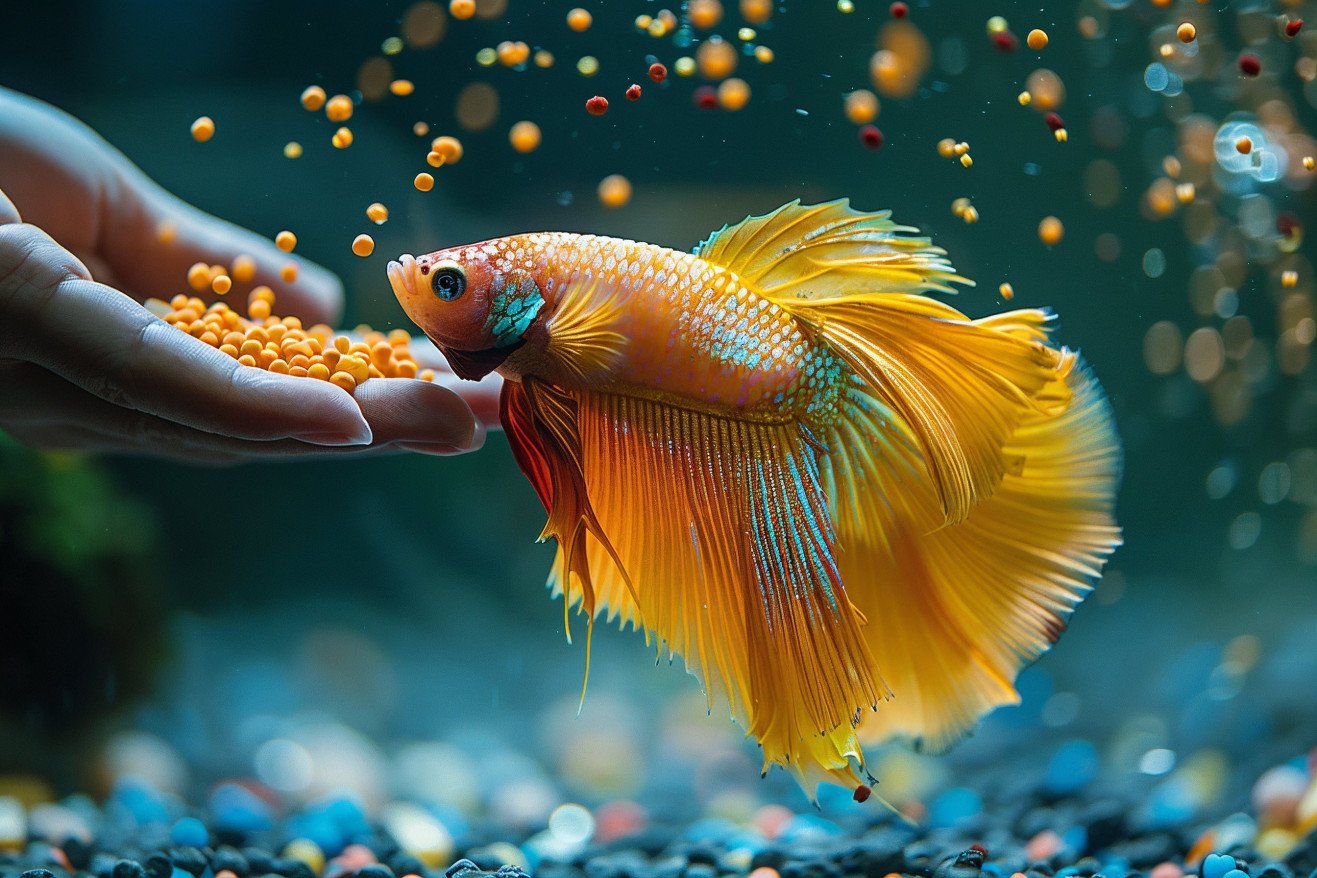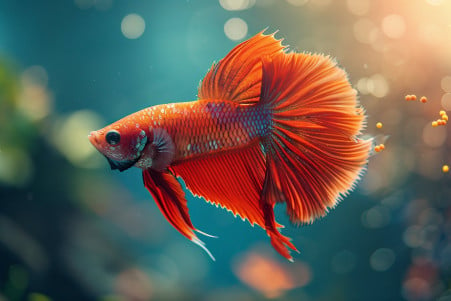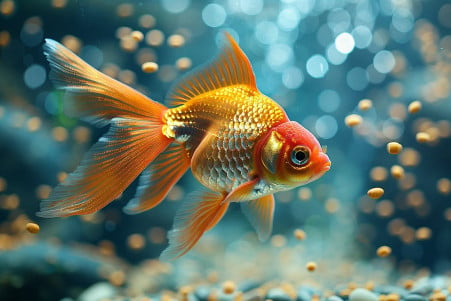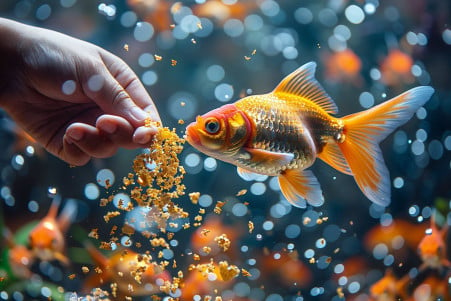How Much Should You Feed a Betta Fish? Optimal Feeding Practices
16 April 2024 • Updated 16 April 2024

Have you ever found yourself wondering how much you should be feeding your betta fish? Betta fish should be fed 2-4 pellets or flakes twice per day, spread out into two separate meals. Make sure that your betta eats all of the food you give them within a few minutes, as any uneaten food can lead to water quality issues in their tanks or bowls. It's important to make sure that you're feeding them the right amount to keep them healthy and their water clean.
To get a full picture of the feeding habits of these popular pet fish, we will cover care recommendations from aquarium professionals and experienced hobbyists. By looking at research on everything from nutritional requirements and digestive limitations to the needs of bettas in captivity, you will leave with a good understanding of the best feeding schedule for your betta fish to ensure that they are as healthy as possible.
How often should you feed a betta fish?
Maintaining a Regular Feeding Schedule
Maintaining a regular feeding schedule is important for keeping your betta fish's metabolism and overall health in check. According to FishVet.com, bettas should be fed at least twice a day, with feeding times being 6-8 hours apart. While older bettas can be fed twice a day, younger fish under 6 months old should be fed 3-5 times a day to support their development, the same article explains.
In addition to helping you manage how much you're feeding your betta, a regular feeding schedule will help you avoid digestive problems like constipation and bloating that can occur when you overfeed your fish. As TheSpruePets explains, tropical fish like bettas are meant to graze throughout the day rather than eating one or two large meals. A regular feeding schedule will help you stay consistent with this natural feeding pattern.
If you're going to be away from home, AquariumLabs recommends using automatic feeders or vacation feeding blocks to make sure your betta fish stays on schedule. These devices can be set to dispense food at specific times, ensuring your fish continues to eat at regular intervals while you're gone.
By making sure you're feeding your betta fish twice a day from the time you bring it home, you'll be giving it the best chance for a healthy future. Feeding your fish at regular intervals throughout the day will help you avoid common feeding problems and ensure your fish is getting the right amount of food for its age and other individual needs.
Proper Portion Control and Preventing Overfeeding
The recommended portion size for adult bettas is one serving the size of the fish's eye per meal, according to FishVet.com. This can be anywhere from 2-3 pellets to 10-12 pellets, depending on the food and the size of the betta.
Overfeeding can lead to the rapid accumulation of uneaten food in the betta's small tank or bowl, causing the water to become fouled. According to AquariaDise, signs of overfeeding include a distended belly, lethargy, uneaten food, and constipation in the betta. To avoid overfeeding, FishVet.com suggests observing the betta during and after feeding and removing any uneaten food after a few minutes.
Proper portion control is essential for maintaining a healthy tank environment and the betta's well-being. By monitoring the betta's food intake and adjusting portion sizes as necessary, you can make sure your colorful companion gets the nutrition they need without the problems that can come from overfeeding.
Fasting and the Benefits of Fasting for Betta Fish
Betta fish can go without food for a few days, and most sources, including a discussion on the Betta Fish Forum, suggest fasting for 3-5 days. Introducing a fasting day once a week can be healthy for bettas. As Betta Buddy notes on Medium, fasting can help the betta's digestive system rest and reduce bloating and constipation, which can be especially important for bettas that are eating processed, non-natural foods like pellets.
That said, fasting for more than a week at a time is not recommended, as it can lead to the betta's health declining. As with many things, it's important to fast bettas in moderation. However, by giving them a break from eating every so often, you can help ensure that their digestive systems are healthy and that they are feeling their best.
Best Foods for Betta Fish
Bettas are carnivorous and need a high-protein diet in captivity, according to Bettafish.org. Therefore, it's best to stick to high-quality commercial betta foods that list protein as the first ingredient. This is because bettas have short digestive systems and can't digest fillers like corn and wheat well.
In addition to commercial foods, live or frozen foods like mosquito larvae, brine shrimp, and bloodworms can be a good way to add variety and mental stimulation to your betta's diet. According to FishTankWorld, while bettas can eat pellets or flakes, live/frozen foods are generally better for their nutritional needs.
In general, you can also feed your betta small amounts of human foods like peas, vegetables, and unseasoned seafood as a treat, but these foods should never make up the bulk of your betta's diet. It's also important to feed your betta a well-balanced diet that includes a variety of foods. Finally, it's important to remember that bettas can't digest many of the foods that people eat, so it's important to feed them a diet that's appropriate for their digestive systems.
By feeding your betta a well-balanced diet that includes high-quality commercial foods and live or frozen options, you can make sure your betta gets the nutrition they need to be healthy in captivity.
Tank Setup and Environmental Considerations
The minimum tank size for a betta fish is 19 liters (5 US gallons) or larger, according to BettaBoxx. Larger tanks lead to more stable water conditions, less chance of disease, and more room for decorations and other fish. In fact, PNW Bettas notes that larger tanks mean less frequent water changes and better water quality.
Bettas like longer, shallower tanks that allow for horizontal swimming and easy access to the water's surface. This is especially important since bettas are labyrinth fish, which means they breathe air at the water's surface. Aqueon suggests that the tank be longer than it is tall to accommodate a betta's natural swimming patterns.
A proper tank setup also includes a secure lid, heater, thermometer, and water that's soft and kept at a consistent temperature with low flow, according to FishLab. In addition, it's important to acclimate a new betta to its tank slowly to prevent stress and potential health problems, according to Josh's Frogs.
If you make sure to set up a tank that's the right size and has the right equipment and conditions, you can help your betta fish be as healthy and happy as possible and live a long life.
Conclusion: Important Things to Remember About Feeding Betta Fish
Betta fish should eat 2-4 pellets or flakes twice a day, and portion sizes should be about the size of their eye. It is important to stick to a regular feeding schedule and watch for signs of overfeeding. While fasting for a day once a week can be helpful, it is best to avoid long-term fasting.
It is best to make sure that bettas have a diverse diet that includes a mix of high-quality commercial foods and live/frozen options. It is important to make sure that you have the right tank setup and that you acclimate your betta to its new environment slowly.


